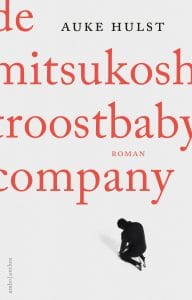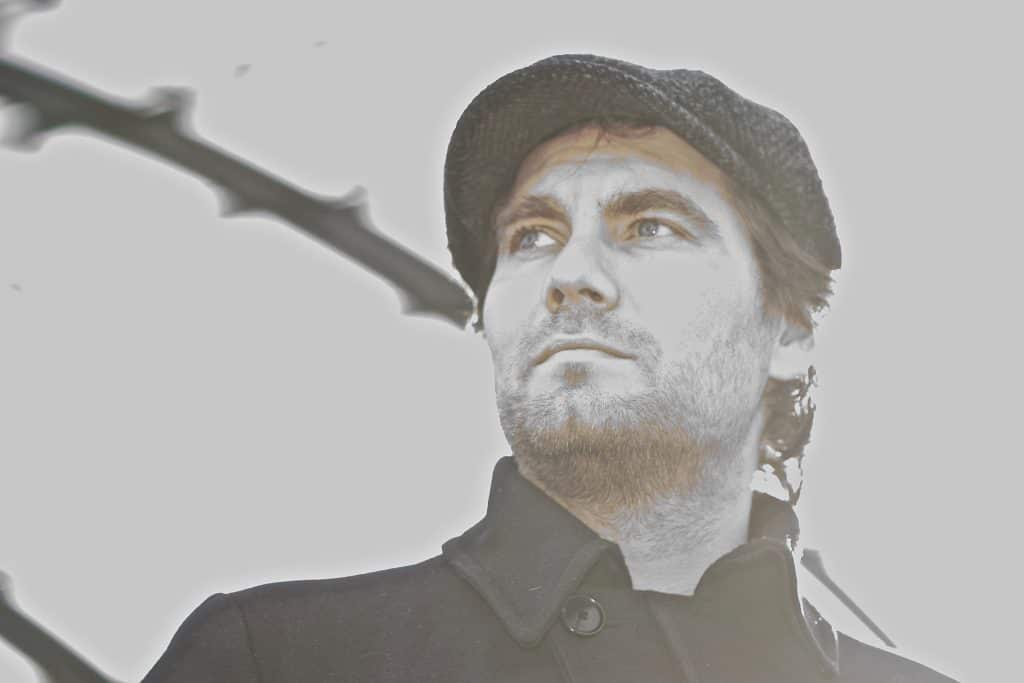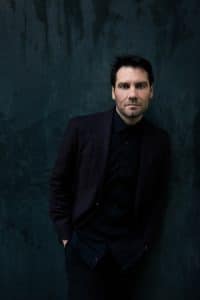Het is misschien wel zijn meest ambitieuze roman tot nu toe, en tegelijk de eerste waarover hij eigenlijk liever niet wil praten. In De Mitsukoshi Troostbaby Company snijdt schrijver Auke Hulst (46) namelijk een gevoelig en persoonlijk thema aan: de rouw om een ongeboren kind.
Nabije toekomst
De Mitsukoshi Troostbaby Company is een roman zoals alleen Auke Hulst die schrijft. Al was het maar omdat het verhaal zich afspeelt in de nabije toekomst, in een wereld die lijkt op de onze maar waarin de geschiedenis net een beetje anders is gelopen. De hoofdpersoon van de roman is sciencefictionschrijver Auke van der Hulst, die terugdenkt aan een kortstondige maar hevige relatie. Zijn ex-vriendin raakte onbedoeld zwanger. Na het aanvankelijke plan er samen voor te gaan, verandert zij van gedachten en laat ze de foetus weghalen.

Al vindt hij dat het volledig haar beslissing is, toch draagt de verteller dat nog jarenlang met zich mee. Maar in deze toekomstige wereld is er voor mensen zoals hij de Japanse Mitsukoshi Troostbaby Company, waar ouders een kind kunnen bestellen. Een machine, maar niet van echt te onderscheiden en compleet met herinneringen aan een niet-bestaande jeugd. Auke krijgt een 7-jarige dochter mee naar huis, Scottie, aan wie hij zich sterk hecht. In het nieuwe autobiografische boek dat hij aan het schrijven is, dat gaat over die teloorgegane liefdesrelatie en het verlies van een ongeboren kind, laat hij zijn hoofdpersoon Kaj terugreizen in de tijd in een poging de gebeurtenissen ongedaan te maken.
Twee romans tegelijk
Een schrijver (Auke Hulst) die een roman schrijft over een schrijver (Auke van der Hulst) die een roman schrijft over een schrijver (Kaj) – De Mitsukoshi Troostbaby Company is een roman met een droste-effect en een ingenieuze structuur. ‘Dit was veruit het moeilijkste boek om te maken,’ zegt Auke Hulst aan zijn keukentafel. ‘Omdat het een boek ín een boek is, was ik feitelijk twee romans tegelijk aan het schrijven, die op zichzelf staand moesten werken, maar ook in onderlinge samenhang. Een technische uitdaging die verder gaat dan alles wat ik eerder heb gedaan. Toen het af was, was ik compleet gesloopt. Ik heb er ook veel langer aan gewerkt dan normaal: drie jaar. Al zou je ook kunnen zeggen dat ik er wel twaalf jaar aan heb gewerkt.’
Was je er al veel eerder aan begonnen?
‘Ja, het heeft lang liggen gisten in mijn hoofd. Er zitten alinea’s in verwerkt die ik in 2010 of 2011 heb geschreven. Maar toen was ik er nog helemaal niet aan toe. Ik was bang voor dit boek.’
Waarom?
‘Ik heb dit zelf meegemaakt, lang geleden. Mijn toenmalige vriendin raakte zwanger en besloot na een paar maanden het kind weg te laten halen. Daar heb ik jarenlang veel verdriet van gehad. Hoewel ik naderhand geneigd was mezelf vrij te pleiten door te doen alsof het me maar allemaal was overkomen, heb ik natuurlijk zelf ook een aandeel gehad in het mislopen van de relatie. Dat heb ik in dit verhaal onderzocht. Waar ik bijvoorbeeld nooit echt eerlijk over had nagedacht, was de vraag in hoeverre de manier waarop ik ben opgegroeid – een vader die jong is overleden, een moeder die er niet voor ons was – verbonden was met hoe het in latere relaties misging.
Al mijn romans zijn een vorm van zelfonderzoek. De hoofdfiguur in dit boek heet Auke van der Hulst, waarmee ik eigenlijk wil zeggen: ik ben het, maar nét niet helemaal, hij is iemand die zeer sterk op mij lijkt. Ik neem één stap afstand, zodat ik ruimte creëer om te putten uit de werkelijkheid, maar ook om dingen te vervormen. Fictie is als het ware een testopstelling waarin je een bepaald onderwerp op scherp kunt zetten.’

Rouw om een ongeboren kind
Je omschrijft het in de roman heel mooi: het kind zonder vader werd een vader zonder kind.
‘Wat er is geweest was goed beschouwd eigenlijk nog geen mens waarmee je een band kunt hebben. Maar gevoelsmatig werkt dat niet zo. Als je denkt vader te gaan worden, denk je na over namen en begin je over een toekomst na te denken als ouder. Daar voel je al van alles bij, er ontstaan al direct emotionele banden met iets wat er nog niet is. In die zin lijkt het wel ‘n beetje op het creëren van personages; die worden op een bepaalde manier ook heel reëel.
Dat het anders liep, veroorzaakte een gevoel van rouw. Ik was steeds een raar tweegesprek in mijn hoofd aan het voeren. De verstandelijke kant zei: het wás nog geen kind. Maar emotioneel ervoer ik het wel zo. Ik voelde me schuldig, er was verdriet en woede. Die emoties lieten zich niet temmen met ratio. Literatuur is de aangewezen plek om botsende werkelijkheden te onderzoeken die in één hoofd kunnen bestaan. Dat je als man erg pro-choice kunt zijn, kunt vinden dat het écht alleen de beslissing van een vrouw is, en dat het resultaat van die keuze tóch veel verdriet en schuldgevoel teweeg kan brengen.’

Rouw om een ongeboren kind is niet iets waar vaak over wordt gepraat of geschreven, al helemaal niet door mannen.
‘Dat klopt. Een tijd geleden was ik samen met een aantal vrienden die ik al een jaar of vijftien jaar ken, toen het onderwerp toevallig ter sprake kwam. En wat bleek? Nog drie anderen bleken ermee te maken te hebben gehad, zonder dat we dat van elkaar wisten.’
Heb jij er zelf ooit over gepraat?
‘Heel weinig. De eerste tien jaar omdat ik het gewoon niet kon – dan ging ik acuut janken. Later heb ik het weleens besproken als ik een vriendin had, want dan kun je niet om het onderwerp kinderen heen. Maar dat vond ik heel moeilijk. En nog steeds, al kan ik er inmiddels wel over praten.’
Nieuwe inzichten
Toch heeft dat sterke verdriet er niet toe geleid dat je later alsnog kinderen hebt gekregen.
‘Hoewel de abortus niet mijn keuze was, had ik voor mijn gevoel toch mijn rechten verspeeld. Omdat ik diep vanbinnen wist dat ik met mijn gedrag en onbuigzaamheid de situatie in de hand heb gewerkt. Ik had mijn kans gehad en verspeeld. Daar denk ik inmiddels anders over.’
Heeft je zelfonderzoek tot nog meer inzichten geleid?
‘Ja. Ik heb in de spiegel van mijn tekst durven kijken en ben eerlijker tegenover mezelf geworden over hoe lastig het is om samen te leven met een schrijver, hoe belangrijk mijn werk eigenlijk voor me is. De ander moet ervoor inschikken. Bovendien is schrijven een vampiristische bezigheid: je maakt gebruik van zaken uit het leven dat je hebt gedeeld met anderen, terwijl die daar niet om hebben gevraagd. Ik vond het moeilijk om dat aan mezelf toe te geven, omdat het zo lelijk is. Schrijvers die hun werk ongelooflijk belangrijk vinden vind ik irritant. Maar dat is omdat ik zelf ook zo ben.’
Sciencefiction
Zo’n gevoelig onderwerp in de vorm van sciencefiction – een bijzondere keuze.
‘De vorm van mijn roman is een ode aan de literatuur waar ik zoveel aan heb gehad. Doordat ik in een onveilige thuissituatie ben opgegroeid, was ik vroeger bang voor mensen, ik snapte geen fluit van ze. Daardoor was ik echt een outcast. Zo’n gesprek voeren als we nu doen kon ik op mijn twintigste niet. Ik vond steun in boeken. Sciencefiction liet me op een andere, veel diepere manier over het leven en de mens nadenken dan veel andere literatuur. Het vergrootte mijn begrip van de wereld.’
Auke van der Hulst laat zijn hoofdpersoon terugreizen in de tijd zodat hij zijn fouten kan herstellen. Een verlangen dat veel mensen zullen herkennen.
‘Bijna iedereen, denk ik. Ooit brak ik mijn knieschijf op het voetbalveld, omdat ik dacht dat ik nét iets eerder bij de bal kon zijn dan de keeper. Maar hij ging dwars door me heen. Een pijn! Mag de tijd alsjeblieft een paar minuten terug, wenste ik in gedachten, zodat ik de bal kan laten gaan en heel blijf? Ik denk dat veel mensen wel iets hebben wat ze graag ongedaan zouden willen maken.’
In jouw ‘testopstelling’ loopt dat niet goed af.
‘Nee, omdat de gedachte dat je het een volgende keer beter zou doen, denk ik niet klopt. Kaj doet het de tweede en derde keer wel anders, maar omdat er in de basis al een weeffout in de beginsituatie zit, manifesteert die zich toch steeds weer op een andere manier. De gedroomde uitkomst zal daarom nooit komen. Die wetenschap helpt om vrede te hebben met hoe het is gegaan.’
Auke Hulst, De Mitsukoshi Troostbaby Company, 608 p., Ambo Anthos, € 26,99
